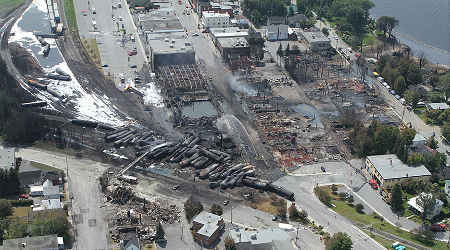Rail News Home Federal Legislation & Regulation
7/6/2018
Rail News: Federal Legislation & Regulation
TSB’s Fox: Five years after Lac-Megantic, safety steps still needed

Although freight-rail safety has improved in the five years since the Lac-Megantic rail disaster, more remains to be done, says the chair of Canada’s Transportation Safety Board (TSB).
Today is the fifth anniversary of the tragic accident, in which a train carrying over 2 million gallons of crude oil derailed in the town of Lac-Megantic, Quebec. The resulting fire and explosions killed 47 people, forced another 2,000 from their homes and destroyed much of the town’s downtown core.
Even before the TSB issued its final investigation report on the tragedy, the agency issued two recommendations aimed at making the nation’s rail network safer. Three additional recommendations were made at the time of the report’s release.
Still, more needs to be done, TSB Chair Kathleen Fox said in a statement issued earlier this week.
“For instance, although the legacy Class III tank cars involved in the Lac-Megantic accident are no longer permitted to transport crude oil, the phase-in period for newer, more robust cars for the transport of flammable liquids is not yet complete — nor is this required before 2025,” she said.
The railroads have made “significant progress” in implementing emergency response assistance plans and conducted planning and risk assessments when large amounts of oil are being moved, Fox noted.
“In the meantime, the issue of additional physical defenses, which the TSB has called for to help prevent uncontrolled movements, has yet to be sufficiently addressed,” she said. “Transport Canada has also strengthened its oversight regime for the railway industry by conducting more frequent and comprehensive audits of railways’ safety management systems, and by striving to ensure that each railway has completed its required corrective action.”
Fox also released the status of the TSB’s five safety recommendations issued in response to the tragedy.
“Once all of them receive the TSB’s highest rating of ‘fully satisfactory,’ the safety of Canada’s rail network should be greatly improved,” she said. “That won’t bring back those who were lost that day, but it will be a big step toward making sure than accident like this never happens again.”
Following are the TSB’s five recommendations and current status:
• The Department of Transport and the Pipeline and Hazardous Materials Safety Administration require that all Class 111 tank cars used to transport flammable liquids meet enhanced protection standards that significantly reduce the risk of product loss when these cars are involved in accidents. Status: satisfactory intent.
• The Department of Transport set stringent criteria for the operation of trains carrying dangerous goods, and required railway companies to conduct route planning and analysis as well as perform periodic risk assessments to ensure that risk control measures work. Status: fully satisfactory.
• The Department of Transport required emergency response assistance plans for the transportation of large volumes of liquid hydrocarbons. Status: fully satisfactory.
• The Department of Transport required Canadian railways to put in place additional physical defenses to prevent runaway equipment. Status: satisfactory in part.
• The Department of Transport audited the safety management systems of railways in sufficient depth and frequency to confirm that the required processes are effective and that corrective actions are implemented to improve safety. Status: satisfactory intent.
Contact Progressive Railroading editorial staff.
More News from 7/6/2018









Be First to Comment